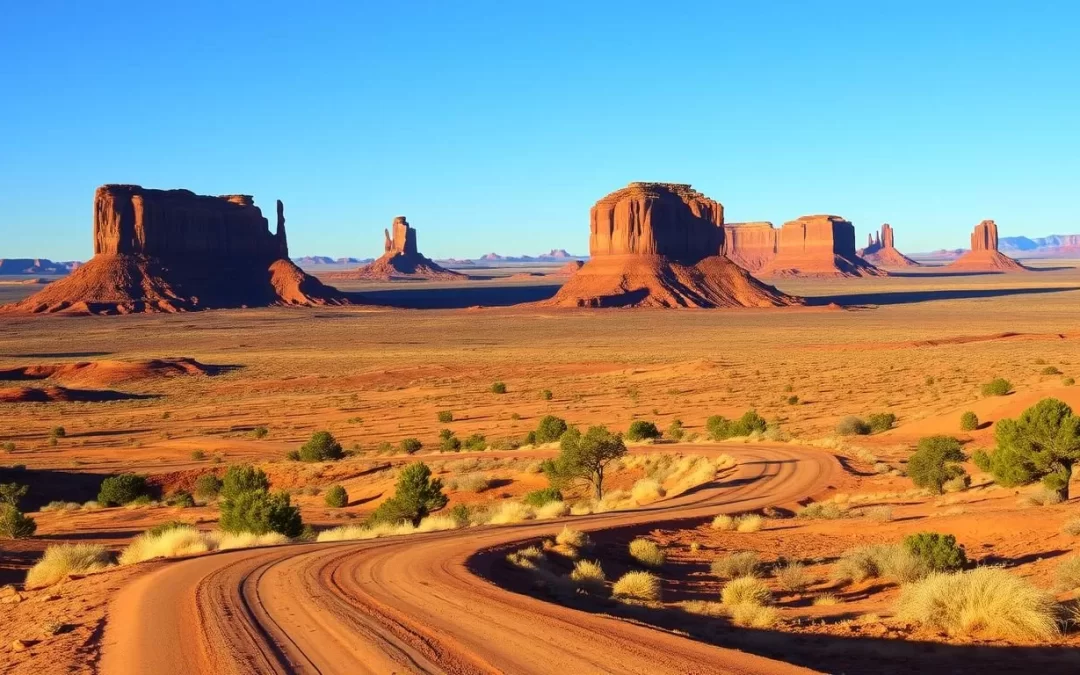Imagine standing amidst a landscape of towering sandstone formations, their rust-red hues glowing under the vast Arizona sky. Monument Valley is a 92,000-acre Navajo Tribal Park that has captivated visitors for generations with its majestic vistas and rich cultural heritage.
Located within the Navajo Nation Reservation on the Utah-Arizona border, this iconic destination offers more than just a quick drive-through experience. With its stunning mesas and buttes, Monument Valley has been the backdrop for numerous films, including John Wayne classics like Stagecoach and Rio Grande.
As you visit Monument Valley, you’ll discover a wealth of activities and viewpoints that make it a must-see destination in the American Southwest. From the famous Tribal Park Loop Drive to guided cultural tours and hiking opportunities, there’s no shortage of ways to experience the best things this incredible landscape has to offer.
Discovering Monument Valley: Nature’s Masterpiece
Standing in Monument Valley is like stepping into a different world, one where nature’s grandeur is on full display. You are surrounded by iconic sandstone formations that have been shaped over millions of years through the relentless forces of erosion.
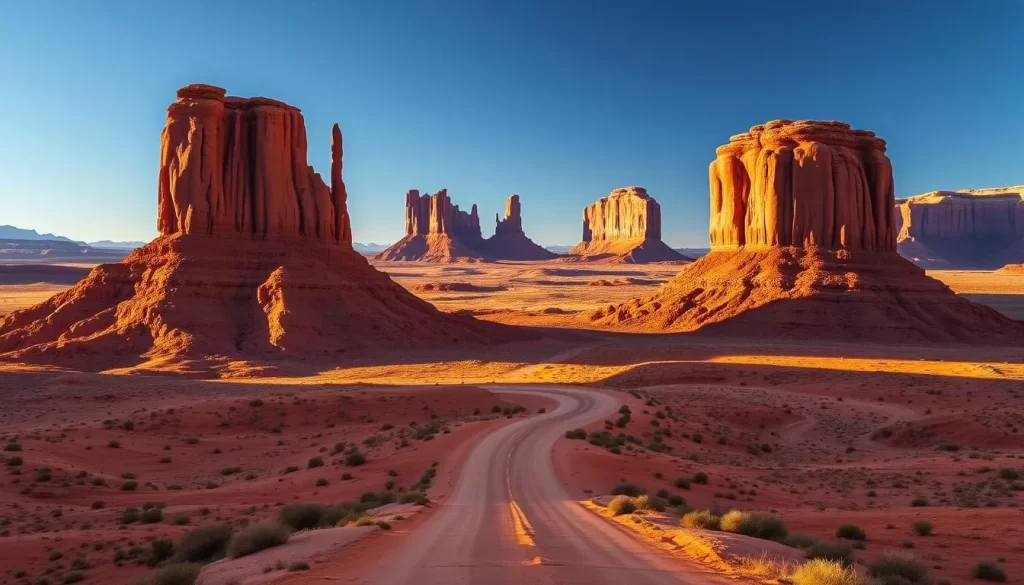
What Makes Monument Valley Special
Monument Valley’s distinctive landscape is characterized by its surreal panorama of sandstone buttes rising dramatically from the desert floor. The valley’s unique geological formation is a result of millions of years of erosion, where water and wind sculpted the plateau into the magnificent formations visible today.
The cultural significance of Monument Valley within Navajo tribal lands is profound, representing a sacred place where natural beauty and indigenous heritage intersect. The area is not just a natural wonder but also a cultural treasure that enhances your experience of Monument Valley.
| Feature | Description | Significance |
|---|---|---|
| Geological Formation | Millions of years of erosion | Unique landscape |
| Cultural Significance | Sacred Navajo land | Intersection of nature and heritage |
| Tourism | Established in 1958 as Navajo Tribal Park | Economic opportunities for Navajo Nation |
A Brief History of Monument Valley
Until the 1930s, Monument Valley was relatively unknown to outsiders, with the Navajo Indians being the primary inhabitants aware of its beauty. It wasn’t until filmmaker John Ford featured the landscape in his Western movies that Valley Monument began to gain international recognition.
The establishment of the Monument Valley Navajo Tribal Park in 1958 was a significant milestone, aimed at preserving the unique landscape and providing economic opportunities for the Navajo Nation. Understanding the geological and historical context of Monument Valley enhances your appreciation of both its natural splendor and cultural importance.
Planning Your Visit to Monument Valley
Monument Valley, a Navajo Tribal Park on the Arizona-Utah border, is a destination that requires some planning to reach. As you prepare for your trip, understanding the location, best time to visit, and the park’s operating hours will help you make the most of your experience.
Location and How to Get There
Monument Valley is located within the Navajo Nation, making it a bit challenging to access. The closest major airports are in Phoenix (320 miles), Albuquerque (324 miles), Las Vegas (400 miles), and Salt Lake City (380 miles). Renting a car is essential for your visit, as public transportation is limited in the area.
Best Time to Visit Monument Valley
The best time to visit Monument Valley depends on your preferences. Spring (April-May) and fall (September-October) are ideal due to mild temperatures and manageable crowds. Summer brings high temperatures around 90°F, with occasional thunderstorms and larger crowds. Winter offers a unique experience with possible light snow and fewer visitors.
Monument Valley Entrance Fees and Hours
The Monument Valley Tribal Park charges an entrance fee of $8 per person per day. The hours of operation vary by season: Peak Season (May1-Sept30) is from 6:00 am to 8:30 pm, and Off Season (Oct1 – Apr30) is from 8:00 am to 4:30 pm.
| Season | Dates | Hours |
|---|---|---|
| Peak Season | May 1 – Sept 30 | 6:00 am – 8:30 pm |
| Off Season | Oct 1 – Apr 30 | 8:00 am – 4:30 pm |
As you plan your visit to Monument Valley, consider these details to ensure a smooth and enjoyable trip. With its unique landscapes and rich cultural heritage, Monument Valley is an experience you won’t forget.
The Iconic Tribal Park Loop Drive
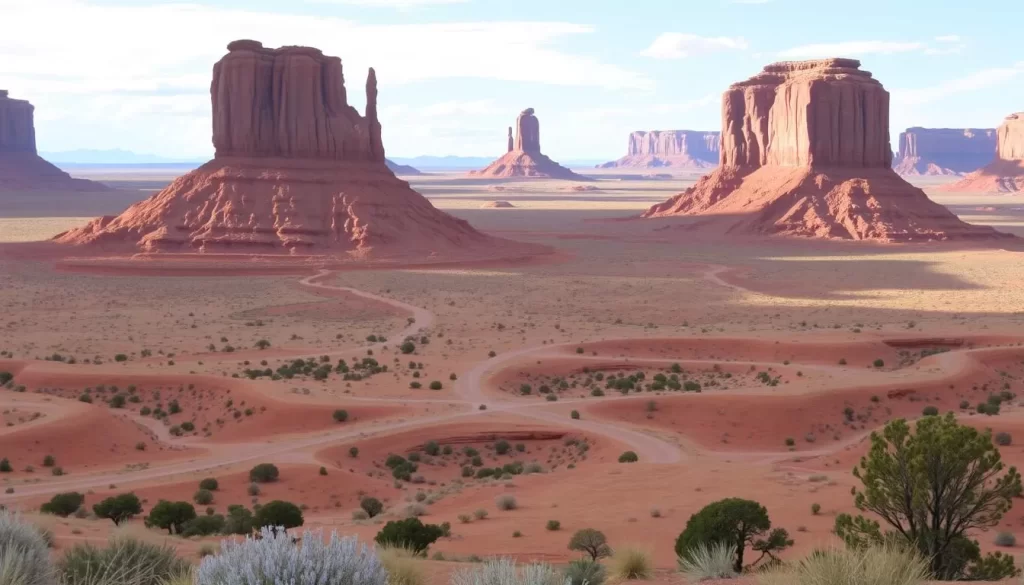
Monument Valley’s Tribal Park Loop Drive is an unforgettable experience that allows you to explore the area’s natural beauty at your own pace. This 17-mile loop, also known as the Valley Drive, is a scenic drive that takes you past some of the most iconic landmarks in Monument Valley.
What to Expect on the 17-Mile Drive
The Tribal Park Loop Drive is a dirt and gravel road that starts and ends at the Monument Valley Visitor Center. You can self-drive this loop without needing a 4×4 vehicle, although RVs and motorcycles are not permitted. The road is bumpy and dusty, with a low speed limit, encouraging you to take your time and enjoy the views.
Be aware that the road can become impassable after rain, even with four-wheel drive. This is the only part of Monument Valley you can visit without taking a guided tour, making it a unique opportunity to explore at your own pace.
Must-See Stops Along the Valley Drive
The Tribal Park Loop Drive is dotted with iconic landmarks that are a must-see for any visitor. Some of the key stops include the Mittens and Merrick Butte, John Ford’s Point, Three Sisters, Elephant Butte, and the Totem Pole. Each of these stops offers unique photo opportunities and a chance to immerse yourself in the natural beauty of Monument Valley.
As you drive through the loop, take your time to appreciate the scenery and stop at the viewpoints that captivate you the most. The self-drive tour allows you to linger and enjoy the landscape without any rush, making it a perfect experience for those with limited time who still want to experience Monument Valley’s grandeur.
Monument Valley’s Most Famous Landmarks
The majestic beauty of Monument Valley is encapsulated in its most famous landmarks. As you explore this iconic landscape, you’ll encounter formations that have become synonymous with the American West. These natural wonders are not only breathtaking but also steeped in history and cultural significance.
The Mittens and Merrick Butte
The Mittens and Merrick Butte are perhaps the most recognizable formations in Monument Valley. The East and West Mittens are named for their distinctive shape, resembling hands with thumbs sticking out. These iconic buttes are best viewed from the visitor center area or along the Valley Drive, offering spectacular photo opportunities, especially during sunrise and sunset when the red sandstone glows brilliantly.
![]()
John Ford’s Point
John Ford’s Point, named after the famous director who popularized Monument Valley in Western films, provides one of the most dramatic panoramic views in the park. This overlook features a popular photo opportunity with a Navajo horseman, and it’s customary to tip the rider if you photograph them. The area around John Ford’s Point also offers souvenir shopping and local food options, making it a perfect stop to experience both the natural beauty and cultural aspects of Monument Valley.
| Landmark | Description | Best Viewing Time |
|---|---|---|
| The Mittens | Distinctive mittens-shaped buttes | Sunrise, Sunset |
| Merrick Butte | Prominent butte near the Mittens | Sunrise, Sunset |
| John Ford’s Point | Panoramic view with Navajo horseman | Anytime, but sunrise and sunset for best light |
Totem Pole and Yei Bi Chei
Near the iconic formations, you’ll find the Totem Pole, a thin, tall spire rising dramatically from the valley floor, standing at approximately 450 feet tall. The Yei Bi Chei formations, named after Navajo ceremonial dancers, add another dimension to the already impressive landscape of Monument Valley, offering breathtaking views and photo opportunities.
Hiking the Wildcat Trail
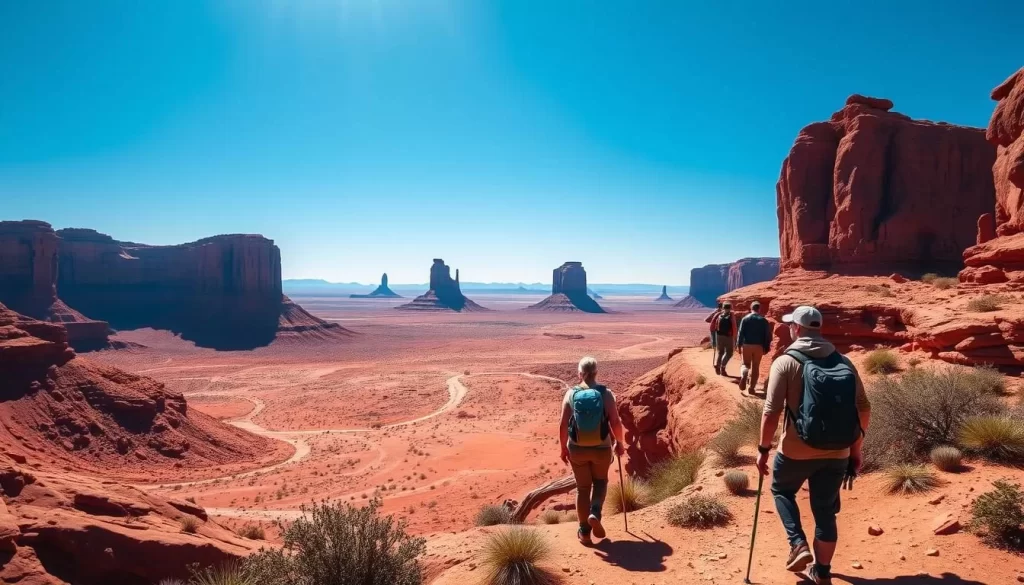
For those seeking a more immersive experience in Monument Valley, hiking the Wildcat Trail is an absolute must. This 3.9-mile loop trail offers a unique opportunity to explore the valley’s majestic formations up close.
Trail Details and Difficulty
The Wildcat Trail is the only self-guided hiking trail within the Navajo Tribal Park, starting near the visitor’s center. It’s rated as moderately difficult due to its sandy terrain and limited shade, with an elevation gain of approximately 380 feet.
Key trail details include:
– Distance: 3.9 miles
– Elevation Gain: 380 ft
– Difficulty: Moderate
Tips for Hiking in Monument Valley
To make the most of your Wildcat Trail experience, consider the following tips:
– Start early to avoid the heat and capture the buttes in the beautiful morning light.
– Bring at least 2 liters of water per person and wear sun protection.
– Wear sturdy footwear suitable for sandy terrain.
– Respect Navajo cultural sites and rules along the trail.
The trail takes approximately 2-3 hours to complete, offering a more intimate Monument Valley experience and unique perspectives for photography enthusiasts.
Guided Tours in Monument Valley
With a guided Monument Valley tour, you can unlock the secrets and stories behind Monument Valley’s breathtaking landscapes. A guided tour offers a unique perspective on this natural wonder, allowing you to delve into the history and culture of the area.
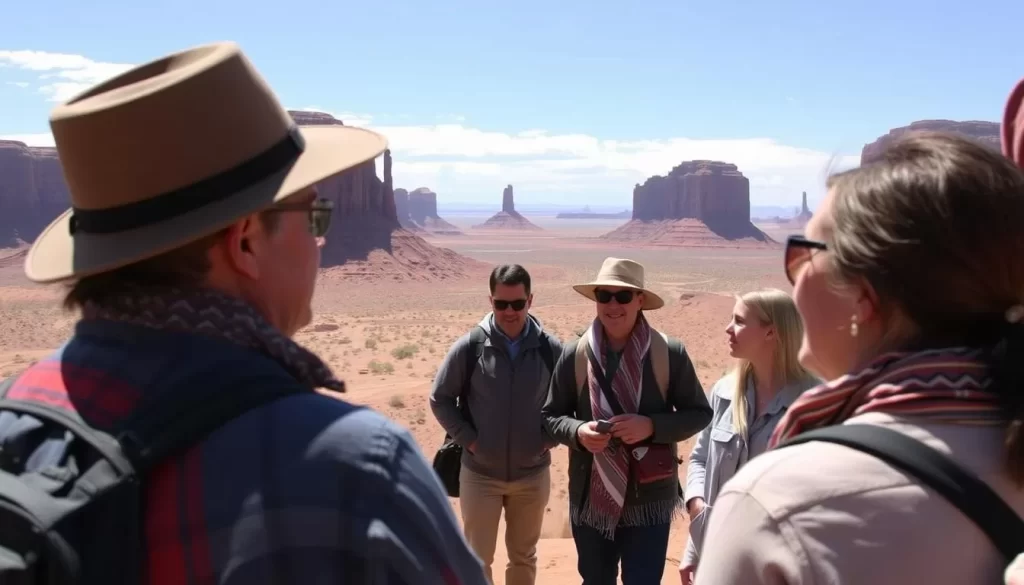
Lower Monument Valley Tour
The Lower Monument Valley Tour takes you beyond the standard Valley Drive, providing access to restricted areas that self-driving visitors cannot reach. You’ll get up close to the Totem Pole and other rock formations, with knowledgeable Navajo guides sharing stories and history along the way. This 3-hour tour costs around $80 per person.
Mystery Valley Tour
The Mystery Valley Tour focuses on cultural experiences, taking you to ancient Anasazi ruins, petroglyphs, and archaeological sites. This tour reveals the rich human history of the region and lasts 3 to 4 hours, costing around $90 per person.
Image of Mystery Valley Tour
Teardrop Arch Tour
The Teardrop Arch Tour offers a more adventurous experience, taking you off the beaten path to explore caves and unique rock formations. The tour culminates with views of the distinctive Teardrop Arch.
Image of Teardrop Arch Tour
Choosing the Right Tour for You
When choosing a valley tour, consider your interests (photography, culture, adventure), physical abilities, time constraints, and budget. Prices range from approximately $80 for standard tours to over $300 for premium experiences like Hunt’s Mesa.
Monument Valley, Arizona: Best Things to Do for Photography Enthusiasts
For photography enthusiasts, Monument Valley is a paradise, offering unparalleled opportunities to capture the essence of the American West. With its majestic buttes and vast expanses, this iconic landscape provides a unique backdrop for photographers to hone their craft.
![]()
Best Photography Spots in Monument Valley
Monument Valley offers numerous vantage points for capturing its breathtaking beauty. The View Hotel viewpoint is particularly renowned for providing a classic shot of the Mittens and Merrick Butte, especially during sunrise when the first light illuminates these sandstone formations with a warm glow. Other notable spots include the North Window viewpoint, which offers excellent framing opportunities for East Mitten Butte, and Artist’s Point, providing a more panoramic perspective of the valley’s iconic formations.
- The View Hotel viewpoint for classic shots of the Mittens and Merrick Butte
- North Window viewpoint for framing East Mitten Butte
- Artist’s Point for a panoramic view of the valley
Sunrise and Sunset Photography Tips
To capture the best photographs in Monument Valley, timing is crucial. The morning and early afternoon provide optimal lighting conditions, while late afternoon can create challenging sun glare when facing west. Sunrise photography is particularly rewarding, with the eastern light creating dramatic shadows and rich colors on the buttes. For night photography enthusiasts, Monument Valley’s dark skies are perfect for astrophotography, offering spectacular Milky Way shots above the distinctive landscape.
Tip: Plan your shooting schedule carefully to make the most of the natural light. An early start, especially during summer, is essential for capturing the best sunrise shots.
Cultural Experiences in Navajo Nation
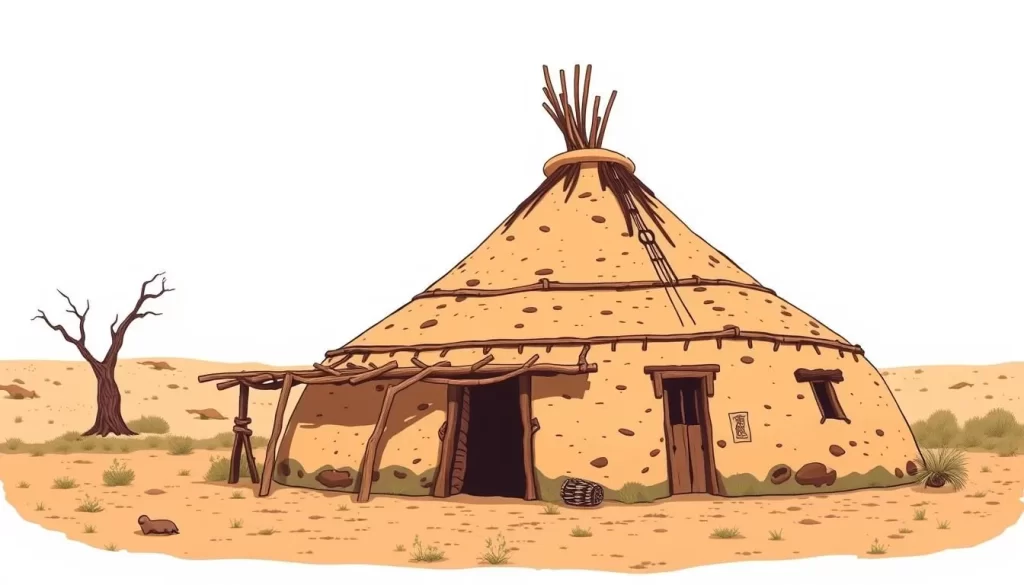
Beyond its iconic landscapes, Monument Valley is home to a wealth of cultural experiences that allow visitors to connect with the Navajo Nation. Immersing yourself in Navajo culture is an essential part of the Monument Valley experience, offering insights into the people who have called this stunning landscape home for generations.
Visiting a Traditional Navajo Hogan
Visiting a traditional Navajo Hogan provides a glimpse into indigenous architecture and lifestyle. These sacred dwellings are often accompanied by demonstrations of weaving, storytelling, or traditional music, giving visitors a deeper understanding of Navajo heritage. A tour that includes a visit to a Navajo Hogan can be a meaningful way to engage with the local culture.
Stargazing Tours and Cultural Significance
Stargazing tours in Monument Valley combine astronomy with cultural education. Navajo guides share their traditional understanding of celestial bodies and the stories that have been passed down through generations. This unique blend of science and culture enhances your appreciation of the Valley Navajo landscape.
By engaging with the Navajo culture, you can gain a deeper understanding of why Monument Valley is considered sacred and how the Navajo people have maintained their traditions. Remember to approach these cultural experiences with respect and an open mind.
Where to Stay in Monument Valley
To fully immerse yourself in the beauty of Monument Valley, selecting the right accommodation is key. The area offers a variety of options to suit different preferences and budgets, ensuring that your stay is as memorable as the iconic landscape itself.
The View Hotel
The View Hotel, located within the Monument Valley Tribal Park, offers luxurious rooms with private balconies facing the iconic Mittens. The higher the floor, the more breathtaking the view. Rooms are priced accordingly, making it a premium choice for those seeking unparalleled views. The hotel’s Premium Cabins are another excellent option, offering a more secluded experience with decks that overlook the valley.
Goulding’s Lodge
For those looking for alternatives just outside the Tribal Park, Goulding’s Lodge is a great choice. It offers comfortable rooms with valley views, a restaurant, an indoor pool, and a museum showcasing the area’s rich film history. Goulding’s also operates a campground for those who prefer to stay under the stars.
Camping Options in Monument Valley
Camping is another way to experience Monument Valley’s natural beauty. The View Campground within the Tribal Park and Goulding’s Campground nearby offer scenic views and the chance to sleep under the stars with the silhouettes of the buttes visible from your tent or RV. For a truly unique experience, consider an overnight camping trip to remote locations like Hunt’s Mesa with specialized tour companies.
Dining Options and Local Cuisine
As you explore Monument Valley, you’ll discover dining options that serve more than just a meal. The area offers a unique blend of traditional Navajo cuisine and standard American fare, all set against the breathtaking backdrop of one of the most iconic natural wonders in the United States.
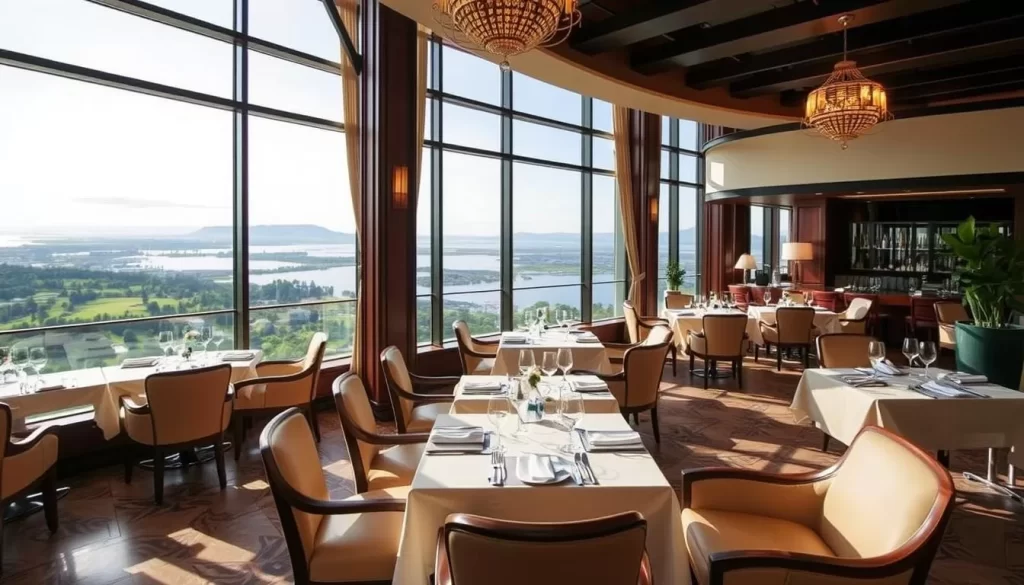
Where to Eat in Monument Valley
The View Restaurant inside The View Hotel is a convenient option, offering breakfast, lunch, and dinner with panoramic views of the Mittens. Another choice is Goulding’s Stagecoach Dining Room, which serves a mix of American and Navajo dishes, though at a higher price due to the remote location.
Must-Try Navajo Dishes
Be sure to try the Navajo fry bread, a traditional staple often used as the base for the popular Navajo taco, topped with beans, cheese, lettuce, and tomatoes. For a more authentic experience, consider visiting Amigo Café in Kayenta, about a 30-minute drive from the Monument Valley Visitor Center.
Beyond Monument Valley: Nearby Attractions
The area around Monument Valley is replete with hidden gems waiting to be explored. While Monument Valley is a must-visit destination, the surrounding area offers several other attractions that can enhance your trip.
Valley of the Gods
The Valley of the Gods features a landscape similar to Monument Valley but with fewer tourists. It’s perfect for those who enjoy scenic drives and want to avoid the crowds. With no entrance fee, it’s an attractive option for budget-conscious travelers.
Mexican Hat Rock Formation
Named for its resemblance to a Mexican Sombrero, this rock formation is a great spot for photos. You can view it from US-163, and for the adventurous, hiking up onto the formation is an option.
Goosenecks State Park
For a unique perspective on the San Juan River, visit Goosenecks State Park. The park features a dramatic series of tight turns in the river, akin to multiple Horseshoe Bends. A $5 entry fee grants access to the viewpoint.
![]()
| Attraction | Location | Entry Fee |
|---|---|---|
| Valley of the Gods | Near Monument Valley | Free |
| Mexican Hat Rock Formation | US-163 | Free |
| Goosenecks State Park | San Juan County, UT | $5 |
Conclusion
Monument Valley’s unique blend of natural beauty and cultural significance makes it a must-visit destination in the American Southwest. The Tribal Park Loop Drive offers an accessible way to experience the valley’s iconic landscapes, including the mittens and Merrick Butte. With options to hike the Wildcat Trail, take a guided tour, or simply enjoy the views from The View Hotel, you can tailor your visit to your interests and time.
For the best experience, consider staying overnight to witness the breathtaking sunrise and sunset over the buttes. Whether you have a few hours or several days, Monument Valley rewards visitors with unforgettable vistas and a deeper understanding of Navajo traditions.
The above is subject to change.
Check back often to TRAVEL.COM for the latest travel tips and deals.
